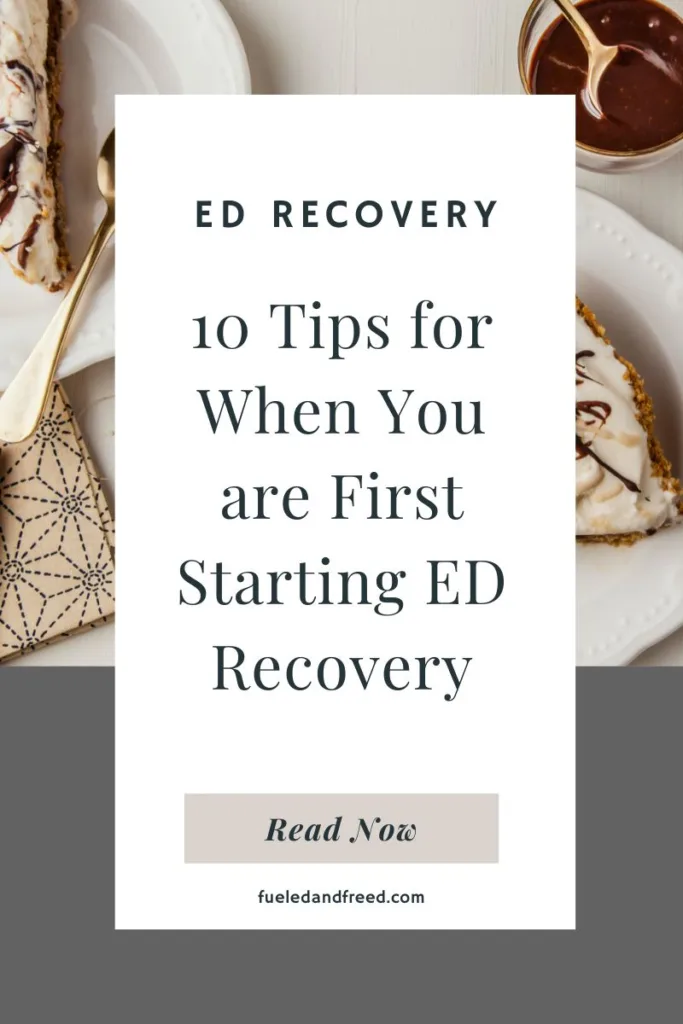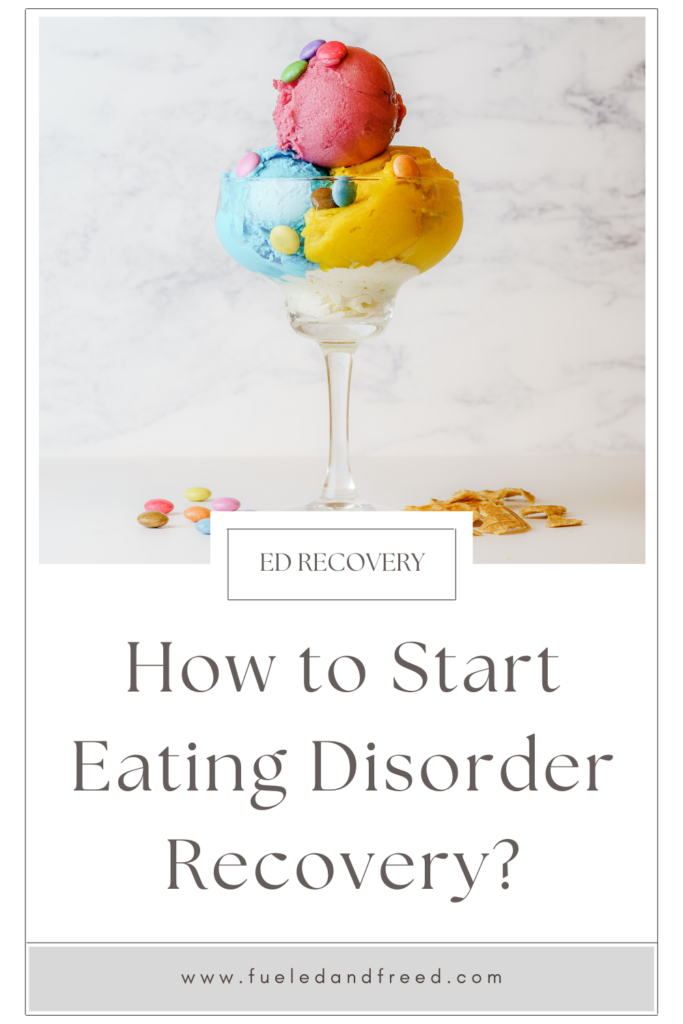Want to start your healing journey but don’t know how to start eating disorder recovery? These 10 actionable steps will help guide you toward full, sustainable, and successful ED recovery.
Entering the world of eating disorders can be daunting and intimidating, I know. But it doesn’t need to feel so overwhelming.
The decision to start eating disorder recovery is a huge, brave, and remarkable one.
In a culture that praises restriction, dieting, weight loss, overexercising, and other potentially-disordered behaviors, being able to recognize that there is a problem is a big feat. If you can do that, you have already begun winning this battle.
When struggling with how to start eating disorder recovery, it can be easy to get so overwhelmed that you want to back down. Don’t!
This journey may be emotional, messy, and complex, but recovery is the best choice you can make for yourself. As someone who has personal and professional experience in recovery, I know this for sure.
Here is just what you need to know to start eating disorder recovery.
10 Actionable Steps for Beginning Eating Disorder Recovery
Step 1: Recognize the Problem
The first step in taking down your eating disorder is acknowledging that it is there.
This sounds much more simple than it truly is, I know.
The actual process of acknowledging and coming to terms with the fact that you have an ED can be deeply emotional and very complex – yet, it is an essential part of eating disorder recovery.
For many of us, it’s tempting to run away from the thing that is hurting us. Facing it often feels harder than pushing it down and pretending it doesn’t exist.
But, refusing to acknowledge the ED will not solve anything.
In fact, the longer we postpone addressing the issue, the stronger the eating disorder tends to grow. The sooner we can acknowledge it and address it, the better.
This is why recognition is the first (and HUGE) step when uncovering how to start eating disorder recovery.
Step 2: Let Go of Self-Judgment
When coming to terms with the fact that you are struggling, it’s important that you refrain from placing blame or judgment on yourself. Eating disorders have a tendency to manipulate your mind to a place of self-deprecation and self-judgment.
Your eating disorder is NOT your fault.
It is not your fault that you are struggling. Even when it feels hard to not place blame on yourself, it’s important that you remember that an ED is not a sign of weakness or a flaw. It is a serious mental illness that does not discriminate in who it impacts.
It’s also important to remember that…
Eating disorders are not a choice.
You did not choose this for yourself. This is one of the main judgments and misconceptions surrounding eating disorders.
Please know that I see you and recognize that this is not something you have chosen for yourself. In no way are you to blame for the struggle you are facing.
Having an eating disorder is not your fault, but choosing recovery is your responsibility.
That’s why I am so proud of you for seeking out the proper steps on how to start eating disorder recovery.
Step 3: Speak Up
Putting words to your struggle is a very valuable step in the eating disorder recovery process.
Not only does this help with acceptance, but it also allows you to connect with others who can support you along the journey toward recovery.
Whether you open up to a friend, family member, significant other, teacher, counselor, coach, doctor, or anyone else in your life, voicing your struggle is a very helpful step in ED recovery.
If you don’t have someone in your immediate circle that feels safe to open up to, I highly recommend seeking support elsewhere.
A professional (therapist, dietician, doctor, or coach like myself) can be a great person to tell. There are even free support groups and options if finances are a barrier.
Put words to what you are going through. This can help with self-acceptance and removing any shame or stigma you may be battling. Vocalizing your ED can even be empowering.
Don’t be afraid to speak up.
Step 4: Seek Support
You don’t need to face this alone. Let people in.
Opening up to a loved one or trusted person in your life is a great first step. The people in your everyday life can be a great source of support and accountability.
That said, professional support for ED recovery is highly recommended whenever possible.
Seeing a therapist or coach is a great place to begin. From there, they may suggest building an outpatient recovery team, depending on your own specific needs.
From what we know about EDs, professional support is one of the best ways to increase the odds of full, sustained recovery from an eating disorder.
If you are feeling overwhelmed with where to get started, feel free to contact me. We can work together to get you the support you need to free yourself from your ED.

Ready to Start Your Healing Journey Today?
Ready to break free from your ED?
Contact me for a free 15-minute discovery call to figure out the next best steps for your recovery journey.
Step 5: Get Educated
We are not often educated about eating disorder facts and, as a result, many of us have a skewed perception of what an eating disorder is and/or looks like.
Getting educated on eating disorders will be crucial to your healing journey.
Working with a professional is a great option, of course. But there are some free/inexpensive ways to educate yourself on EDs as well.
Eating Disorder Educational Resources:
- Credible blogs, websites, and journals
- ED professionals on social media (be sure you are following me on TikTok and Instagram!)
- Books
- Professionals on YouTube
- ED organization sites (NEDA, Center for Discovery, etc.)

Recovery Book Reading Checklist
Here is the ultimate reading checklist to support your recovery.
- 10 recovery reading book resource recommendations
- Additional spaces to add your own books to read
- Bulleted checklist to track your progress
Step 6: Get Accountability
Accountability is one of the most helpful tools when looking to start eating disorder recovery.
If you live with somebody, they can make for a great accountability partner. Consider opening up to them about your struggle with food and ask if they would be willing to be a source of accountability for you.
This may include:
- having meals together
- asking them to make or plate your meals for you
- checking in before and after meals
- daily check-ins
- setting an example of consistent and “normal” eating
If you are starting ED recovery and live alone, you may consider reaching out to someone for virtual support. This may be a friend, parent, significant other, sibling, or ED recovery coach.
Most of my clients find that the daily chat support check-ins throughout the day provide the sense of accountability they need to take steps forward in their recovery.
Step 7: Discover Your Recovery “Why”
To be blunt, recovery is hard.
There will be days when you want to quit, give up, or throw in the towel. It can be exhausting.
This is when it is especially important to have a strong sense of WHY you are choosing recovery. A strong “why” can be the driving factor for remaining on track with recovery when it feels incredibly difficult.
Consider making a “reasons to recover” list to refer to/add to when you need that extra reminder of why recovery is the right choice.
You may also find that it is helpful to create a vision board for what your life could look like outside of your ED. Include hobbies, fun trips, social interactions, yummy foods, and other simple daily joys that you will see in your life recovered.
Step 8: Learn to Embrace Discomfort
Again, recovery is hard. It’s messy and it’s uncomfortable.
A huge part of recovery is simply using coping tools and strategies to get through the incredibly uncomfortable moments.
Discomfort in recovery is unavoidable. If you can’t avoid them, you must begin to learn how to accept them, embrace them, and get through them.
One of my main roles as an ED Recovery Coach is to provide my clients with the in-the-moment coping tools to get through the really uncomfortable moments.
If you wait for recovery to feel easy, you will be stuck waiting. Like most things in life, the biggest changes happen when you are pushed outside of your comfort zone.
Roll up your sleeves and begin to accept that you will feel uncomfortable… and it’ll be worth it.
Just because it’s hard, doesn’t mean it’s wrong.
Discomfort is inevitable in ED recovery. Learn to cope and embrace the ride. It does pay off in the end.
Step 9: Retrain Your Mind
I have great news. It’s called neuroplasticity.
In simplified terms, this is your brain’s ability to modify, adapt, and be retrained.
When we first start eating disorder recovery, we have deeply engrained neural pathways that support the eating disorder thoughts, behaviors, beliefs, and habits.
However, by challenging these behaviors and utilizing neural retraining techniques, we can literally rewire our brains to new ways of thinking.
Pretty cool, huh?
I work with my clients to build an understanding of grounding, thought reframing, and neural retraining techniques to build a recovery-focused brain that replaces the engrained ED-focused thoughts.
This process takes time, patience, and discomfort… but retraining your brain is possible.
That’s pretty exciting!
Step 10: Fall in Love with Life Outside of the Eating Disorder
If we’re honest, having an eating disorder takes up a lot of space in your life – time, energy, thoughts, focus, etc.
Starting recovery from your eating disorder can feel like you are losing a piece of your life.
This can be daunting, of course, but also incredibly exciting. When in recovery, you get to redefine what you want for your life.
New hobbies, social interactions, relationships, passions, and identities are out there for you. Without your eating disorder consuming so much of your life, you make space for YOU to exist. How liberating is that?!
Get started creating a life that you love – no eating disorder allowed!
Explore new activities, meet new people, redefine your style, and explore new places and parts of yourself.
This is a time for YOU. Be unapologetically selfish with yourself and where you dedicate your energy. Without the ED around, you are free.
Take time to build a life that you fall in love with.

5 Quick Reminders for Starting Eating Disorder Recovery
Now that you know how to start eating disorder recovery, you may be ready to jump in headfirst. (I hope so!)
But before you go, here are 5 quick reminders for beginning ED recovery that I want you to take with you from this post.
Your eating disorder is not your fault.
You did not choose your eating disorder and you are not at fault for having an eating disorder. Yes, this is your reality right now and it is up to you to CHOOSE recovery, but do not blame yourself for being here.
This is not a sign of weakness. In fact, you will be so much stronger for this.
Give yourself grace and allow yourself to feel emotions surrounding your ED, but remember that it is not your fault you are struggling.
Recovery is not linear.
Like most things in life, there will be ups and downs in recovery. Some days will go great, others may leave you feeling like you want to give up.
Don’t forget that this is all part of the process.
If you feel like you are taking steps back, you can get back on track. This does not have to define you. This is the nature of recovery.
Ups and downs – recovery is one heck of a ride!
Your journey is uniquely yours.
DO NOT COMPARE YOUR JOURNEY TO SOMEONE ELSE’S.
Your ED is unique and your recovery will be unique, too.
There is no rulebook or timeline for recovery. Ultimately, this is your life and this is your journey. You are empowered to take this in whatever way you want. No two recoveries have ever looked the same, so there is no sense in comparing.
You are not alone.
While your ED and your recovery are unique to you, that doesn’t mean you are alone in it.
Eating disorders have a way of making you feel isolated, I know. But remember that you are not alone in this. So many people understand your struggle and have been/are where you are too.
You’re not broken and you’re not the only one feeling this way. I promise.
It gets better.
As someone who has recovered and now works with others in their recovery journey, I can confidently say that it DOES get better, even when it doesn’t feel like it will.
Recovery is possible.
A life outside of your eating disorder is possible and so worth it. (I promise… I am living it!)
On those days where it doesn’t feel like it will get better, please remember that it can and it will… as long as you commit to choosing recovery right now.
Trust the process. The pain, struggle, and discomfort in the short term will lead you to a more free and fulfilling life in the long term.
Keep fighting!


